hyperthyroidism support
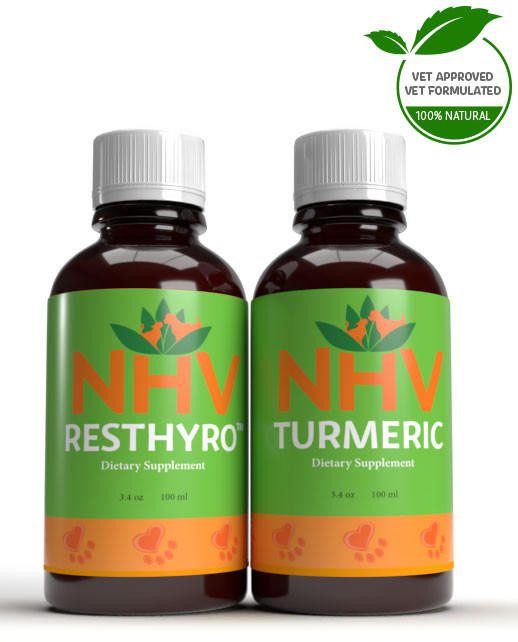
free shipping over $100 (USA & Canada)
1-877-937-4372 the pet expert hotline

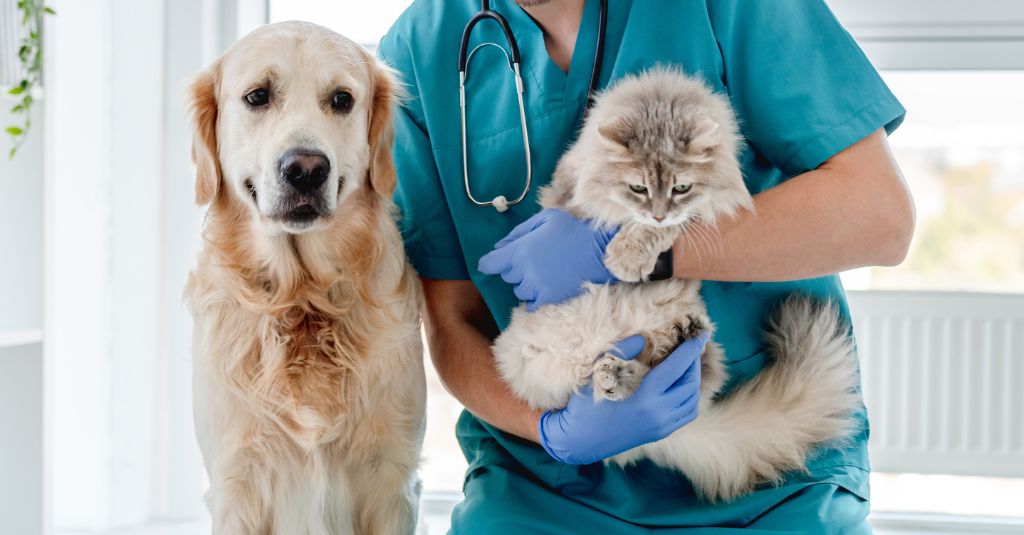
“Why Is My Pet Having Thyroid Issues?” As a veterinarian, I often hear this question from concerned pet parents, especially when their dog starts gaining weight unexpectedly or their senior cat begins to lose weight and act restless. Thyroid problems in dogs and cats are more common than most people realize, and they can significantly impact your companion’s energy, metabolism, and long-term wellness.
Let’s take a closer look at what causes thyroid problems in dogs and cats, how these conditions differ between species, and what pet parents can do to help support thyroid health naturally.
Thyroid disease presents differently in dogs and cats. Understanding the distinction is key to proper diagnosis and treatment.
In dogs, hypothyroidism, an underactive thyroid, is by far the most common thyroid disorder. It usually occurs in middle-aged to older dogs and is more frequent in medium to large breeds.

Primary causes of hypothyroidism in dogs include:
In cats, hyperthyroidism, an overactive thyroid, is the most common endocrine disorder, typically affecting cats over the age of 10.
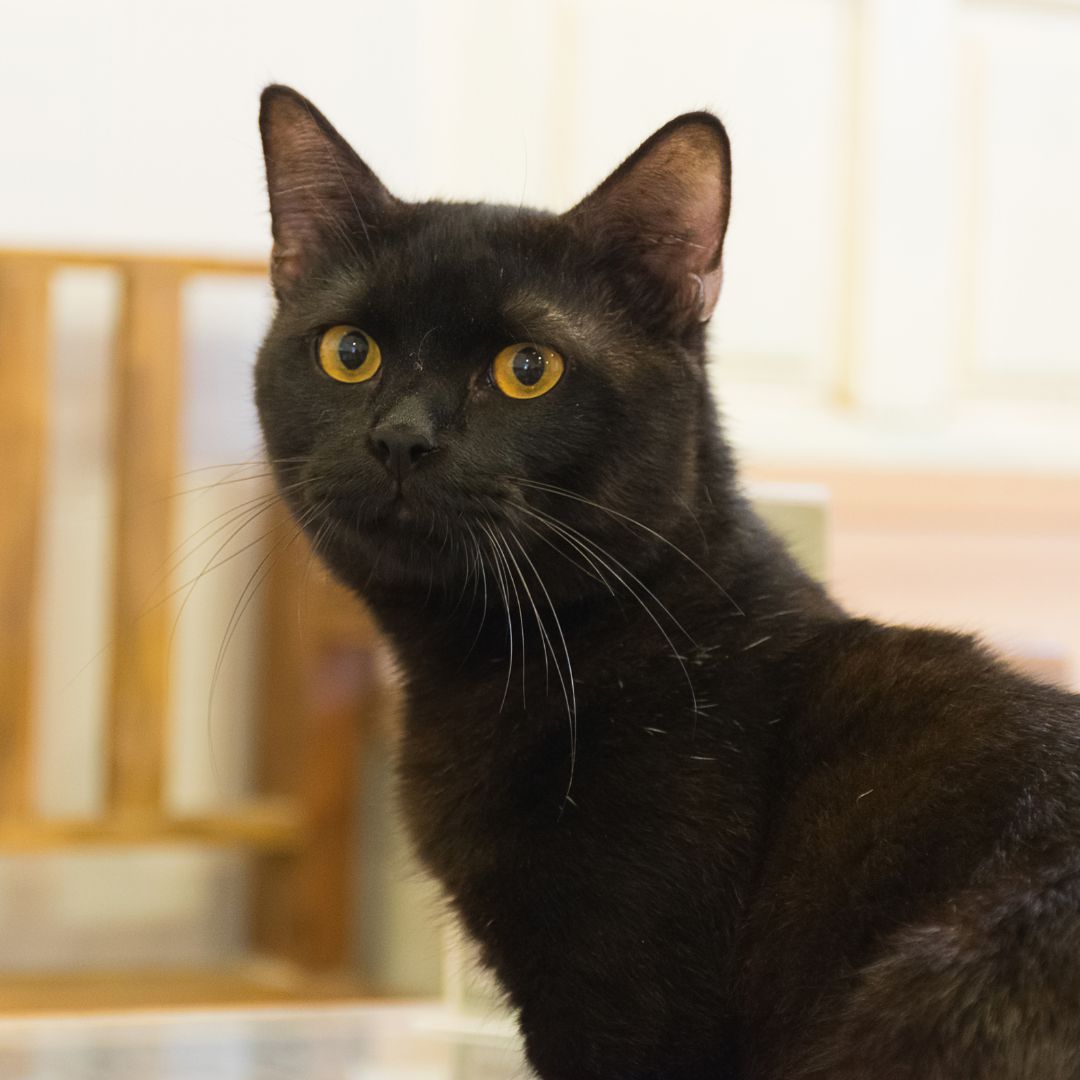
Common causes of feline hyperthyroidism include:
Symptoms in cats include weight loss despite increased appetite, increased thirst and urination, hyperactivity, vomiting, diarrhea, and a scruffy or unkempt coat.
Can pets develop thyroid issues? Yes, both dogs and cats can develop thyroid imbalances, though the type and cause differ by species.
Certain breeds of dogs are more likely to develop hypothyroidism. These include Golden Retrievers, Dobermans, Boxers, Cocker Spaniels, and Irish Setters.
In cats, there’s no strong breed predisposition, but hyperthyroidism is more common in older cats regardless of breed.
Age is a major risk factor. Dogs often develop hypothyroidism between the ages of 4–10. Cats generally show signs of hyperthyroidism after age 10.
Exposure to endocrine-disrupting chemicals (EDCs) such as polybrominated diphenyl ethers (PBDEs), found in some pet foods, furniture, and dust, may be linked to thyroid imbalances, especially in cats.
Dietary iodine levels can also play a role. Both deficiency and excess iodine have been associated with altered thyroid function in pets.
While we can’t always prevent thyroid disorders, especially when genetics or aging are involved, we can take steps to support overall thyroid health naturally.
Avoid ultra-processed pet foods when possible. Look for limited-ingredient, whole-food-based diets that are free from artificial additives and preservatives. Some therapeutic diets are iodine-controlled and may be recommended for pets with diagnosed thyroid conditions.
At NHV, we offer several natural pet supplements formulated to support endocrine and immune function:
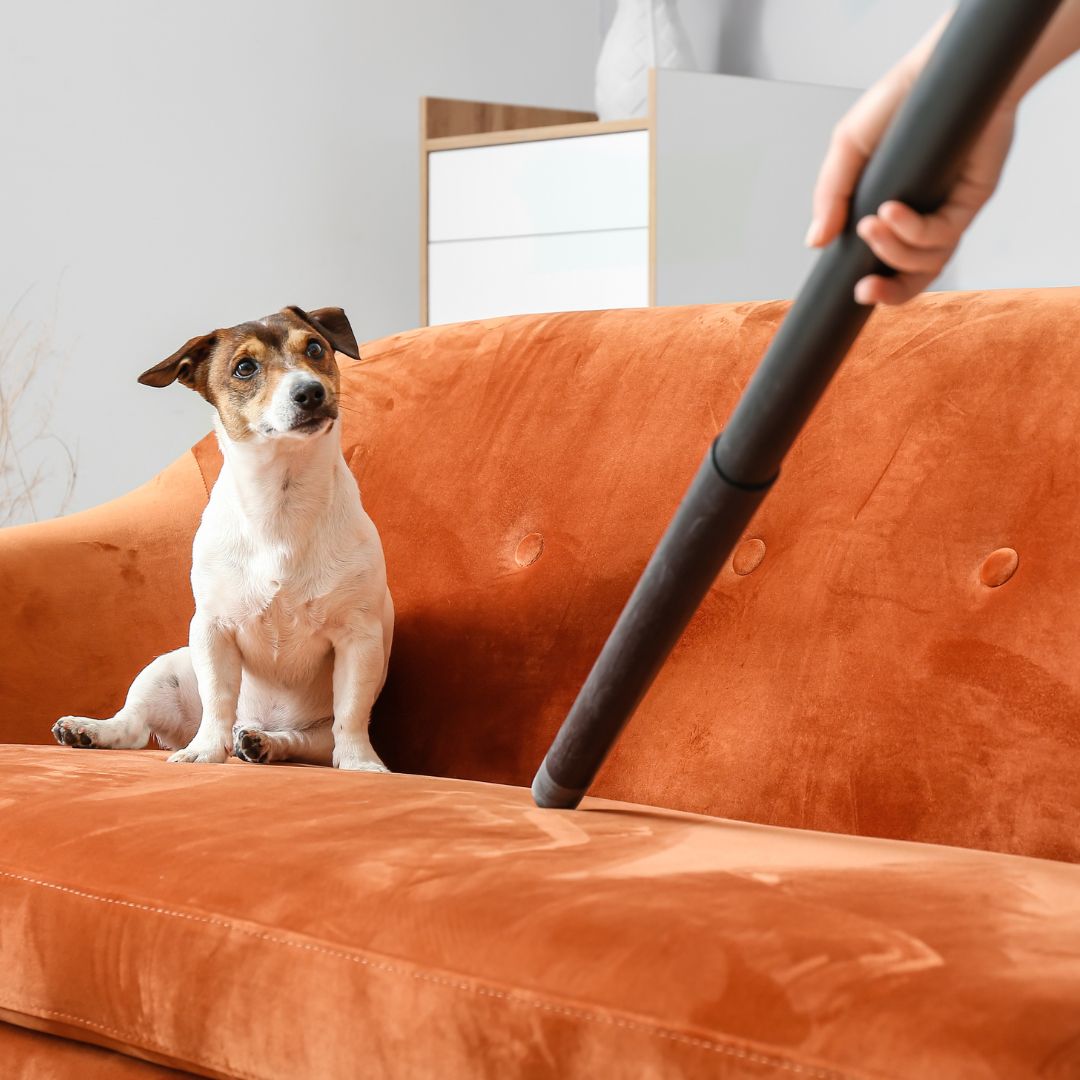
Chronic stress can disrupt endocrine balance. Make time for regular play, enrichment, and bonding with your pet. For anxious pets, consider natural calming supplements or pheromone diffusers.
Thyroid imbalances can be challenging, but with early recognition and integrative care, including veterinary support, appropriate medication, and natural supplements, many pets go on to live long, happy lives.
If you’ve been wondering, “Can pets develop thyroid issues?” the answer is yes, and understanding the thyroid imbalance causes in pets is the first step toward helping them feel their best.
For more guidance on supporting thyroid health naturally, feel free to reach out to our NHV Pet Experts or browse our full line of herbal support products.
hyperthyroidism support

Natural Support for Hyperthyroidism in Cats & Pets
bundle and save with pet expert kits
3 month supply for a small to medium size pet
What is it?
A complete kit to support your pet through symptoms of hyperthyroidism.
How Does it Work?
Why Should I Trust It?
Safe to use long-term, vet-formulated, and vet-approved.

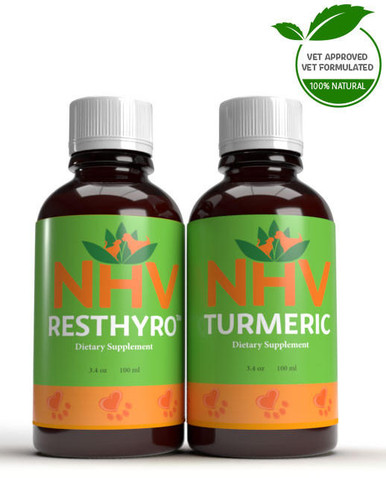
What is it?
A complete kit to support your pet through symptoms of hyperthyroidism.
How Does it Work?
Why Should I Trust It?
Safe to use long-term, vet-formulated, and vet-approved.

This supplement has been formulated combining several different herbs that are known to help control thyroid hormone production, and support heart circulatory and kidney function.
When using supplements to support hyperthyroidism it is important that the organs most affected by the condition are supported as well. Turmeric contains curcumin, which is a powerful antioxidant that makes it beneficial for discomfort and inflammation. Research has found that it is a powerful herb for heart health. It helps with hypertension, lowers bad cholesterol and supports both the heart and liver function. It is also beneficial in aiding digestion and diarrhea in cats and dogs.
Natural Support and can be used in conjunction with Vet-Prescribed Treatment of Hyperthyroidism in Cats
Hyperthyroidism is a common condition seen in middle-aged to older cats. This condition is exceedingly rare in dogs. Hyperthyroidism is caused when there is an overproduction of thyroid hormones T3 and T4. As the thyroid hormones control the function of nearly all the organs, it is common to see secondary health conditions such as heart disease, hypertension, and kidney disease.
With NHV’s Hyperthyroidism Gold Support Kit, you will get an effective blend of herbs that are safe to use long-term and are vet-recommended natural treatments for hyperthyroidism in cats. Find out how Penny improved her quality of life with NHV’s plant-based products.
Read more about hyperthyroidism medicine for cats on our blog at Vet Talk with Dr. Hillary Cook, because at NHV we want to support pet parents to help their fur babies in every way possible.
NHV’s Hyperthyroidism Gold Support Kit contains two potent blends of vet-formulated herbal supplements that may help support your cat’s thyroid as well as the overall function of the thyroid gland.
1.NHV’s Resthyro — A powerful blend of herbs that help control thyroid function as well as supporting heart circulation and kidney function make this a great additional support as well as being a vet-recommended natural support for hyperthyroidism in cats.
2.NHV’s Turmeric — A potent antioxidant and anti-inflammatory that contains curcumin, which is highly effective for discomfort and inflammation. This herb also aids in
Select your pet's weight to determine the correct dose.
To be taken twice daily. Determine your pet’s weight and then use the easy chart below to determine the correct dose. This is the minimum dosage.
Pet's Weight Dosage
0 - 15 lb = 0.5 ml
16 - 30 lb = 1.0 ml
31 - 45 lb = 1.5 ml
46 - 60 lb = 2.0 ml
61 - 75 lb = 2.5 ml
Over 75 lb = 3.0 ml
For small animals (rabbits, ferrets), avians and reptiles use 1 drop for every 2 lb of body weight.
How to Administer
Shake well before use. The easiest method is to use the dropper provided and place the drops into your pet’s food or favorite treat. You can also use the dropper and squirt directly into the pet’s mouth. Some pets can be finicky, if this occurs consider hiding the drops in foods most pet’s love such as fish, chicken or yogurt or a favorite treat. If your pet only eats dry food then soak a few kibbles at feeding time.
For Best Results
Herbal dietary supplements are beneficial to the health and well-being of your pet and are safe for long-term use. Every pet responds to natural herbal supplements differently, therefore it is important to be consistent and administer the product daily. Supplements generally take two to four weeks to take effect, however this will vary from one animal to the next.
Product Storage
All NHV Natural Pet Products are pure herbal extracts and contain no artificial additives, preservatives or coloring. Shelf life after opening is 6 months and must be refrigerated after opening.
Cautions and Contraindications
Do not use in pregnant or nursing animals.
All information provided by NHV Natural Pet Products is for educational purposes only.
This supplement has been formulated combining several different herbs that are known to help control thyroid hormone production, and support heart circulatory and kidney function.
When using supplements to support hyperthyroidism it is important that the organs most affected by the condition are supported as well. Turmeric contains curcumin, which is a powerful antioxidant that makes it beneficial for discomfort and inflammation. Research has found that it is a powerful herb for heart health. It helps with hypertension, lowers bad cholesterol and supports both the heart and liver function. It is also beneficial in aiding digestion and diarrhea in cats and dogs.
Natural Support and can be used in conjunction with Vet-Prescribed Treatment of Hyperthyroidism in Cats
Hyperthyroidism is a common condition seen in middle-aged to older cats. This condition is exceedingly rare in dogs. Hyperthyroidism is caused when there is an overproduction of thyroid hormones T3 and T4. As the thyroid hormones control the function of nearly all the organs, it is common to see secondary health conditions such as heart disease, hypertension, and kidney disease.
With NHV’s Hyperthyroidism Gold Support Kit, you will get an effective blend of herbs that are safe to use long-term and are vet-recommended natural treatments for hyperthyroidism in cats. Find out how Penny improved her quality of life with NHV’s plant-based products.
Read more about hyperthyroidism medicine for cats on our blog at Vet Talk with Dr. Hillary Cook, because at NHV we want to support pet parents to help their fur babies in every way possible.
NHV’s Hyperthyroidism Gold Support Kit contains two potent blends of vet-formulated herbal supplements that may help support your cat’s thyroid as well as the overall function of the thyroid gland.
1.NHV’s Resthyro — A powerful blend of herbs that help control thyroid function as well as supporting heart circulation and kidney function make this a great additional support as well as being a vet-recommended natural support for hyperthyroidism in cats.
2.NHV’s Turmeric — A potent antioxidant and anti-inflammatory that contains curcumin, which is highly effective for discomfort and inflammation. This herb also aids in
Select your pet's weight to determine the correct dose.
To be taken twice daily. Determine your pet’s weight and then use the easy chart below to determine the correct dose. This is the minimum dosage.
Pet's Weight Dosage
0 - 15 lb = 0.5 ml
16 - 30 lb = 1.0 ml
31 - 45 lb = 1.5 ml
46 - 60 lb = 2.0 ml
61 - 75 lb = 2.5 ml
Over 75 lb = 3.0 ml
For small animals (rabbits, ferrets), avians and reptiles use 1 drop for every 2 lb of body weight.
How to Administer
Shake well before use. The easiest method is to use the dropper provided and place the drops into your pet’s food or favorite treat. You can also use the dropper and squirt directly into the pet’s mouth. Some pets can be finicky, if this occurs consider hiding the drops in foods most pet’s love such as fish, chicken or yogurt or a favorite treat. If your pet only eats dry food then soak a few kibbles at feeding time.
For Best Results
Herbal dietary supplements are beneficial to the health and well-being of your pet and are safe for long-term use. Every pet responds to natural herbal supplements differently, therefore it is important to be consistent and administer the product daily. Supplements generally take two to four weeks to take effect, however this will vary from one animal to the next.
Product Storage
All NHV Natural Pet Products are pure herbal extracts and contain no artificial additives, preservatives or coloring. Shelf life after opening is 6 months and must be refrigerated after opening.
Cautions and Contraindications
Do not use in pregnant or nursing animals.
All information provided by NHV Natural Pet Products is for educational purposes only.
hypothyroidism support

Thyro-Up & Multi Essentials
bundle and save with pet expert kits
3 month supply for a small to medium size pet
What is it?
Natural supplement bundle for dogs and cats that supports thyroid health, helps regulate hormone levels, promotes a healthy skin, coat, and metabolism, and may help fill nutritional gaps.
How Does it Work?
Why Should I Trust It?
100% natural supplements formulated and approved by vets.


What is it?
Natural supplement bundle for dogs and cats that supports thyroid health, helps regulate hormone levels, promotes a healthy skin, coat, and metabolism, and may help fill nutritional gaps.
How Does it Work?
Why Should I Trust It?
100% natural supplements formulated and approved by vets.

Hypothyroidism is a slow-developing condition and may be misdiagnosed as normal signs of aging. For natural support, our Hypothyroidism Kit is beneficial for dogs and cats with lowered thyroid function who need added nutritional support.
Hypothyroidism (underactive thyroid) is a condition that affects many pets, including dogs and cats. Apart from slowing down, if you notice that your little one’s fur is thinning, their skin is dry and dull or they have sudden weight gain, you may want to book a visit with your vet to run some tests, including a TT4 test, which is a measurement of thyroid hormone levels in the blood.
For pets suffering with hypothyroidism, we'd suggest adding natural pet thyroid supplements like our Thyro-Up and Multi Essentials to support their glandular system as well as support their metabolism.
Hypothyroidism can cause a lot of discomfort for your pet. If left untreated, hypothyroidism may lead to secondary health issues like cardiovascular disease. Ingredients like eleuthero and ginkgo support healthy thyroid function, and brain function. Kelp is rich in iodine which helps activate the thyroid gland while ingredients like licorice and gotu kola contain many beneficial properties for stimulating thyroid hormone production. The antioxidant and sedative properties in Thyro Up help to protect the body from cell damage, and help to soothe inflammation and discomfort. Multi Essentials contains a range of vitamins, minerals and trace elements that are formulated to help stimulate metabolism, promote healthy skin/coat, improve digestion, energy levels and help to fill nutritional voids.
Part of being a pet parent is keeping your furry friend healthy and comfortable. When it comes to natural cat thyroid supplements, our blends have been developed by a holistic veterinarian and a master herbalist to formulate a gentle yet effective remedy to support glandular health. For any questions or concerns about your furkiddo’s thyroid function or overall vitality, an NHV Pet Expert is there to help you every step of the way.
Made with the finest, organically grown, or ethically harvested herbs. Made specifically for pets, vet-formulated, and vet approved.
Thyro-Up for Dogs and Cats
Multi Essentials
Select your pet's weight to determine the correct dose.
To be taken twice daily. Determine your pet’s weight and then use the easy chart below to determine the correct dose. This is the minimum dosage.
Pet's Weight Dosage
0 - 15 lb = 0.5 ml
16 - 30 lb = 1.0 ml
31 - 45 lb = 1.5 ml
46 - 60 lb = 2.0 ml
61 - 75 lb = 2.5 ml
Over 75 lb = 3.0 ml
How to Administer
Shake well before use. The easiest method is to use the dropper provided and place the drops into your pet’s food or favorite treat. You can also use the dropper and squirt directly into the pet’s mouth. Some pets can be finicky, if this occurs consider hiding the drops in foods most pet’s love such as fish, chicken or yogurt or a favorite treat. If your pet only eats dry food then soak a few kibbles at feeding time.
For Best Results
Herbal dietary supplements are beneficial to the health and well-being of your pet and are safe for long-term use. Every pet responds to natural herbal supplements differently, therefore it is important to be consistent and administer the product daily. Supplements generally take two to four weeks to take effect, however this will vary from one animal to the next.
Product Storage
All NHV Natural Pet Products are pure herbal extracts and contain no artificial additives, preservatives or coloring. Shelf life after opening is 6 months and must be refrigerated after opening.
Cautions and Contraindications
Do not use in pregnant or nursing animals.
All information provided by NHV Natural Pet Products is for educational purposes only.
Hypothyroidism is a slow-developing condition and may be misdiagnosed as normal signs of aging. For natural support, our Hypothyroidism Kit is beneficial for dogs and cats with lowered thyroid function who need added nutritional support.
Hypothyroidism (underactive thyroid) is a condition that affects many pets, including dogs and cats. Apart from slowing down, if you notice that your little one’s fur is thinning, their skin is dry and dull or they have sudden weight gain, you may want to book a visit with your vet to run some tests, including a TT4 test, which is a measurement of thyroid hormone levels in the blood.
For pets suffering with hypothyroidism, we'd suggest adding natural pet thyroid supplements like our Thyro-Up and Multi Essentials to support their glandular system as well as support their metabolism.
Hypothyroidism can cause a lot of discomfort for your pet. If left untreated, hypothyroidism may lead to secondary health issues like cardiovascular disease. Ingredients like eleuthero and ginkgo support healthy thyroid function, and brain function. Kelp is rich in iodine which helps activate the thyroid gland while ingredients like licorice and gotu kola contain many beneficial properties for stimulating thyroid hormone production. The antioxidant and sedative properties in Thyro Up help to protect the body from cell damage, and help to soothe inflammation and discomfort. Multi Essentials contains a range of vitamins, minerals and trace elements that are formulated to help stimulate metabolism, promote healthy skin/coat, improve digestion, energy levels and help to fill nutritional voids.
Part of being a pet parent is keeping your furry friend healthy and comfortable. When it comes to natural cat thyroid supplements, our blends have been developed by a holistic veterinarian and a master herbalist to formulate a gentle yet effective remedy to support glandular health. For any questions or concerns about your furkiddo’s thyroid function or overall vitality, an NHV Pet Expert is there to help you every step of the way.
Made with the finest, organically grown, or ethically harvested herbs. Made specifically for pets, vet-formulated, and vet approved.
Thyro-Up for Dogs and Cats
Multi Essentials
Select your pet's weight to determine the correct dose.
To be taken twice daily. Determine your pet’s weight and then use the easy chart below to determine the correct dose. This is the minimum dosage.
Pet's Weight Dosage
0 - 15 lb = 0.5 ml
16 - 30 lb = 1.0 ml
31 - 45 lb = 1.5 ml
46 - 60 lb = 2.0 ml
61 - 75 lb = 2.5 ml
Over 75 lb = 3.0 ml
How to Administer
Shake well before use. The easiest method is to use the dropper provided and place the drops into your pet’s food or favorite treat. You can also use the dropper and squirt directly into the pet’s mouth. Some pets can be finicky, if this occurs consider hiding the drops in foods most pet’s love such as fish, chicken or yogurt or a favorite treat. If your pet only eats dry food then soak a few kibbles at feeding time.
For Best Results
Herbal dietary supplements are beneficial to the health and well-being of your pet and are safe for long-term use. Every pet responds to natural herbal supplements differently, therefore it is important to be consistent and administer the product daily. Supplements generally take two to four weeks to take effect, however this will vary from one animal to the next.
Product Storage
All NHV Natural Pet Products are pure herbal extracts and contain no artificial additives, preservatives or coloring. Shelf life after opening is 6 months and must be refrigerated after opening.
Cautions and Contraindications
Do not use in pregnant or nursing animals.
All information provided by NHV Natural Pet Products is for educational purposes only.
Published: August 15, 2025